江苏省新沂市第二中学高三英语 专题复习 Unit 3 Back to the past学案
- 格式:doc
- 大小:241.50 KB
- 文档页数:12
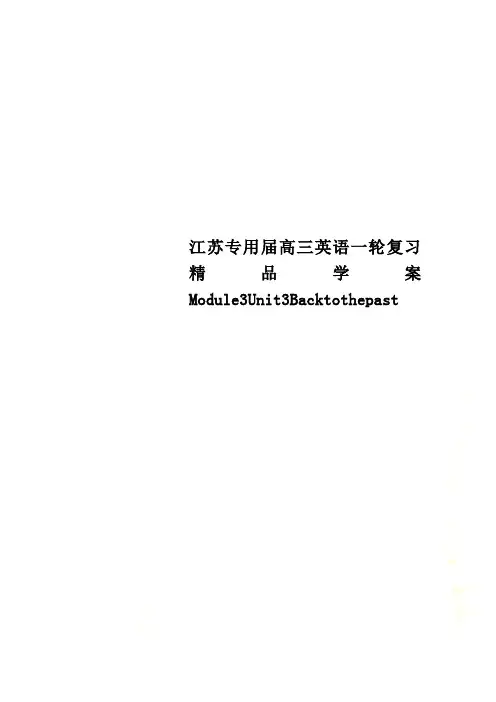
江苏专用届高三英语一轮复习精品学案Module3Unit3BacktothepastUnit 3Back to the past重点单词【1】辨析remain, stay(1) remain与stay表示“留下,继续保持某一状态”时,常作连系动词,可以互换,其后接名词、形容词、介词短语等作表语。
He stayed/remained outside while we entered the room. 他留在外面,我们进了屋子。
(2) 当表示“剩下”(即其余的一切都被拿走、除去、破坏等),通常只用remain而不用stay。
What remains of the original art collection is now in the city museum.原来的艺术收藏品剩下来的现在都在市博物馆里。
(3) 当表示“在某处或在某处住下”时,常用stay而不用remain。
He wants to stay with a friend in the country for a week. 他想和一个朋友在乡下待一个星期。
remaining adj. 剩下的Ladies and gentlemen, please remain ______ until the plane has come to a complete stop.A. seatedB. seatingC. to seatD. seatA句意:女士们,先生们,请在飞机完全停下来之后再离开座位。
考查非谓语动词作表语。
remain“仍然是,保持不变”,是连系动词,后接不定式表示将要发生的动作;seat是及物动词,“使某人就座”为seat oneself,故用过去分词作表语。
【2】protect vt. 保护,from后接能带来伤害或损害之物。
其常用句型为:protect…from/against…He wore a pair of sunglasses to protect his eyes from/against strong light.他戴上太阳镜以保护他的眼睛不受强光影响。
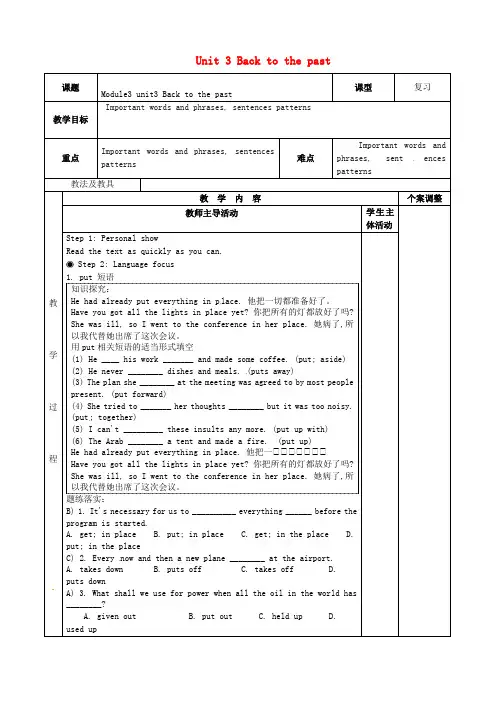
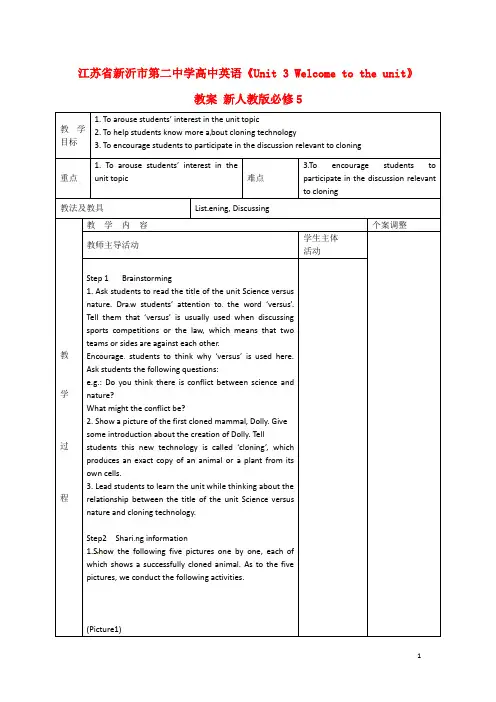
江苏省新沂市第二中学高中英语《Unit 3 Welcome to the unit》教案新人教版必修5教学目标1. To arouse students’ interest in the unit topic2. To help students know more a bout cloning technology3. To encourage students to participate in the discussion relevant to cloning重点1. To aro use students’ interest in theunit topic 难点3.To encourage students toparticipate in the discussion relevantto cloning教法及教具List ening, Discussing教学过程教学内容个案调整教师主导活动学生主体活动Step 1 Brainstorming1. Ask students to read the title of the unit Science versusnature. Dra w students’ attention to the word ‘versus’.Tell them that ‘versus’ is usually used when discussingsports competitions or the law, which means that twoteams or sides are against each other.Encourage students to think why ‘versus’ is used here.Ask students the following questions:e.g.: Do you think there is conflict between science andnature?What might the conflict be?2. Show a picture of the first cloned mammal, Dolly. Givesome introduction about the creation of Dolly. Tellstudents this new technology is called ‘cloning’, whichproduces an exact copy of an animal or a plant from itsown cells.3. Lead students to learn the unit while thinking about therelationship between the title of the unit Science versusnature and cloning technology.Step2 Shari ng information1.S how the following five pictures one by one, each ofwhich shows a successfully cloned animal. As to the fivepictures, we conduct the following activities.(Picture1)the world's first cloned adult animal. The scientistswho cloned Dolly are to stop experiments involving genetically modifying pigs for human organ transplants because of concerns that deadlynew diseases could be passed on to people.(Picture2)The world's first cloned pigs were produced from an adult female pig using a different technique from the one that produced Dolly.(Picture3)Tell students that t he kitten in the picture is called Cc. Its name is from ‘Copycat’. Scientists in the USA created it with a cell taken from its mother, Rainbow. It was born in December 2002.(Picture4)The name of the cloned monkey is ANDi. It is from‘inserted DNA’ spelt backwards. It is the first genetically modified monkey. The technology is different from that used for Dolly.Step 3 Discussion1. Do you think governments should pass laws to prohibit human cloning? Why or why not?Part AThey shouldn’t for…Reasons:1. Cloning can help cure many diseases and save a lot of people lives.2.3.Part BThey should, for…Reasons:1.Cloning can lead to ethical(伦理) problems2.3.Giving an oral reportToday our class had a discussion about whether the governments should pass laws to prohibit human cloning. Some students think that the governments should, for…However, some other students think it necessary to prohibit…, for…In my opinion, …Step 4 HomeworkAssign stu dents to surf the Internet or refer to othersources for further in formation relevant to cloningtechnology, so as to finish the first two questions belowthe pictures. Ask students to make as many notes aspossib le.板书设计教学札记。
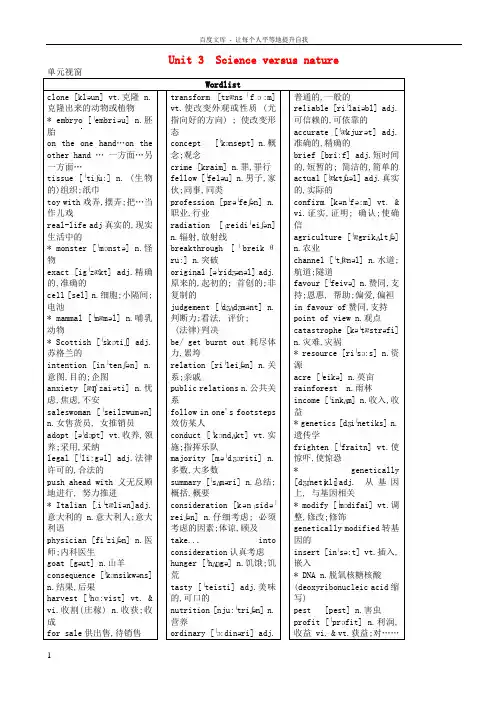
百度文库- 让每个人平等地提升自我Unit 3 Science versus nature 单元视窗Wordlistclone [kləun] vt.克隆 n.克隆出来的动物或植物* embryo [ˈembriəu] n.胚胎on the one hand…on the other hand … 一方面…另一方面…tissue [ˈtiʃu:] n. (生物的)组织;纸巾toy with戏弄,摆弄;把…当作儿戏real-life adj真实的,现实生活中的* monster [ˈmɔnstə] n.怪物exact [igˈzækt] adj.精确的,准确的cell [sel] n.细胞;小隔间;电池* mammal [ˈmæməl] n.哺乳动物* Scottish [ˈskɔtiʃ] adj.苏格兰的intention [inˈtenʃən] n.意图,目的;企图anxiety [æŋˈzaiəti] n.忧虑,焦虑,不安saleswoman [ˈseilzwumən] n.女售货员, 女推销员adopt [əˈdɔpt] vt.收养,领养;采用,采纳legal [ˈli:gəl] adj.法律许可的,合法的push ahead with义无反顾地进行, 努力推进* Italian [iˈtæliən]adj.意大利的 n.意大利人;意大利语physician [fiˈziʃən] n.医师;内科医生goat [gəut] n.山羊consequence [ˈkɔnsikwəns] n.结果,后果harvest [ˈhɑ:vist] vt. & vi.收割(庄稼) n.收获;收成for sale供出售,待销售transform [trænsˈfɔ:m]vt.使改变外观或性质 (尤指向好的方向) ; 使改变形态concept [ˈkɔnsept] n.概念;观念crime [kraim] n.罪,罪行fellow [ˈfeləu] n.男子,家伙;同事,同类profession [prəˈfeʃən] n.职业,行业radiation [ˌreidiˈeiʃən]n.辐射,放射线breakthrough [ˈbreikθru:] n.突破original [əˈridʒənəl] adj.原来的,起初的; 首创的;非复制的judgement [ˈdʒʌdʒmənt] n.判断力;看法, 评价;(法律)判决be/ get burnt out耗尽体力,累垮relation [riˈleiʃən] n.关系;亲戚public relations n.公共关系follow in one's footsteps效仿某人conduct [ˈkɔndʌkt] vt.实施;指挥乐队majority [məˈdʒɔriti] n.多数,大多数summary [ˈsʌməri] n.总结;概括,概要consideration [kənˌsidəˈreiʃən] n.仔细考虑; 必须考虑的因素;体谅,顾及take... intoconsideration认真考虑hunger [ˈhʌŋgə] n.饥饿;饥荒tasty [ˈteisti] adj.美味的,可口的nutrition [nju:ˈtriʃən] n.营养ordinary [ˈɔ:dinəri] adj.普通的,一般的reliable [riˈlaiəbl] adj.可信赖的,可依靠的accurate [ˈæk jurət] adj.准确的,精确的brief [bri:f] adj.短时间的,短暂的; 简洁的,简单的actual [ˈæktʃuəl] adj.真实的,实际的confirm [kənˈfə:m] vt. &vi.证实,证明; 确认;使确信agriculture [ˈægrikʌltʃə]n.农业channel [ˈtʃænəl] n.水道;航道;隧道favour [ˈfeivə] n.赞同,支持;恩惠, 帮助;偏爱,偏袒in favour of赞同,支持point of view n.观点catastrophe [kəˈtæstrəfi]n.灾难,灾祸* resource [riˈsɔ:s] n.资源acre [ˈeikə] n.英亩rainforest n.雨林income [ˈinkʌm] n.收入,收益* genetics [dʒiˈnetiks] n.遗传学frighten [ˈfraitn] vt.使惊吓,使惊恐* genetically[dʒɪˈnetɪklɪ]adj. 从基因上, 与基因相关* modify [ˈmɔdifai] vt.调整,修改;修饰genetically modified转基因的insert [inˈsə:t] vt.插入,嵌入* DNA n.脱氧核糖核酸(deoxyribonucleic acid缩写)pest [pest] n.害虫profit [ˈprɔfit] n.利润,收益 vi. & vt.获益;对……有用chain [ˈtʃein] n.一系列;一连串(人或事)food chain n.食物链permission [pəˈmiʃən] n.准许,许可,批准把你没有记牢的挑出来,好好滴记住哦!The perfect copy Focus Scientists have announced that they have cloned the first human embryo. Thishas caused much debate round the world. On the one hand, some scientists pointout that if you clone an embryo, you can produce valuable human tissues—suchas bone or lung tissue—that could be used to save human lives. On the otherhand, many people, including some scientists, disagree and are afraid that,if mankind toys with nature in this way, we may be on our way to producinga real-life Frankenstein's monster.Cloning is producing an exact copy of a plant or an animal using its cells.The first mammal to be cloned successfully from an adult cell was Dolly thesheep. She was born in 1996 and died in early 2003, at a much younger agethan normal. When she was born, many people were worried that cloning wouldlead to more diseases in the animal world. However, in general the scientistswere praised for their wonderful scientific advance.Ian Wilnut, the Scottish scientist who created Dolly, is shocked that some scientists are now considering cloning human beings. Although he researches cloning, his intention has never been to create copies of humans. Instead,he thinks research efforts should concentrate on creating new tissues andorgans that can be used to cure diseases like cancer. However, some peoplebelieve that cloning human embryos with the intention of destroying them showsno respect for human life.Even though human cloning is causing a lot of anxiety, it is good news forFaye Wilson, a 41-year-old saleswoman who cannot have a baby. ‘I am anxiousto have a child of my own,’ she says. 'I don't want to adopt someone else'schild—if I had the chance, I would have a cloned baby right now.'While cloning human embryos is not legal in many countries, some scientistsare already pushing ahead with research in order to produce a cloned humanbaby. Severino Antinori, an Italian physician, has declared that he wantsto be the first to clone a human being.In China, scientists have focused their efforts on cloning animals, as wellas cloned tissues to be used in medical treatment. China has succeeded in producing clones of cows and goats, and continues to research ways in whichcloning can benefit mankind.Dear Editor,I believe that human cloning is wrong. If we toy with nature, we will haveto deal with the consequences. Who knows what could happen? Human lifewould just become a crop to be harvested or a product for sale.The human race is using up Earth's natural wealth. We should be havingfewer babies in order to reduce Earth's population, not cloning more.I feel sorry for the lady who cannot have a baby, but I would like to pointout that there are many children in the world with no parents who wouldbe delighted to have a mother.Pauline CarterDear Editor,I would like to comment on your article 'The perfect copy'. I think thescientific advances mentioned in your article are fantastic. I am incomplete agreement with human cloning. After all, scientists have been challenging moral ideas for centuries. Why should we stop them now?On a personal note, cloning would totally transform my life. Seven yearsago, my 10-year-old daughter died of heart failure. She was beautiful,cheerful and bright. I miss her every single day. If I had the chance,I would clone her immediately so that I could be with her again.Colin JakeFirst periodListen and learn:Listen to the wordlist and try to learn the words and phrases by heart.◆Step 1:◆Step 2: Personal show●Task 1: Give the following words’ Chinese meaningconsequence n. harvest vt. & vi. n.transform vt. concept n.breakthrough n. conduct vt.nutrition n. reliable adj.brief adj. confirm vt. & vi.●Task 2: Translate the following words戏弄,摆弄;把……当作儿戏n.意图,目的;企图vt.收养,领养;采用,采纳adj.法律许可的,合法的义无反顾地进行, 努力推进效仿某人n.总结;概括,概要n.资源n.仔细考虑; 必须考虑的因素;体谅,顾及n.利润,收益 vi. & vt.获益;对…有用Step 3: Text reading Listen to the text and then finish the following sentences Para. 1Different opinions on the first human embryo 1. _______For: Human embryo cloning canproduce valuable tissues—2. _____bone or lung tissue—that could beused to 3. ______ human lives.Against: We may be on the way toproducing a real-lifeFrankenstein’s .Para. 2Different opinions on the birth of 5. ________For: People 6. _______ scientistsfor the scientific breakthrough.Against: Cloning would create more .Para.3~5Ian Wilmut’s intention Severion Antinori’s intention Research efforts should be 8. ______on creating new tissues and organsfor medical use. Cloning humanembryos with the intention ofdestroying them shows no 9. _____for human life.To be the first to clone a humanbeing.Para. 6Chinese scientists have focused their efforts on cloning 10. ______, aswell as cloned tissues to be used in medical treatment.They have succeeded in cloning cows and goats.1. Read the text2. Try to recite the sentences in step 3-Task 1Second periodStep 1: Personal showWrite down the words according to yourself.Step 2: Language focus◆ 1. intended adj. (为…〉打算的/设计的intention n.意图;目的;企图知识探究:归纳整理:My brother intends to study abroad next year. 我弟弟打算明年到国外留学。
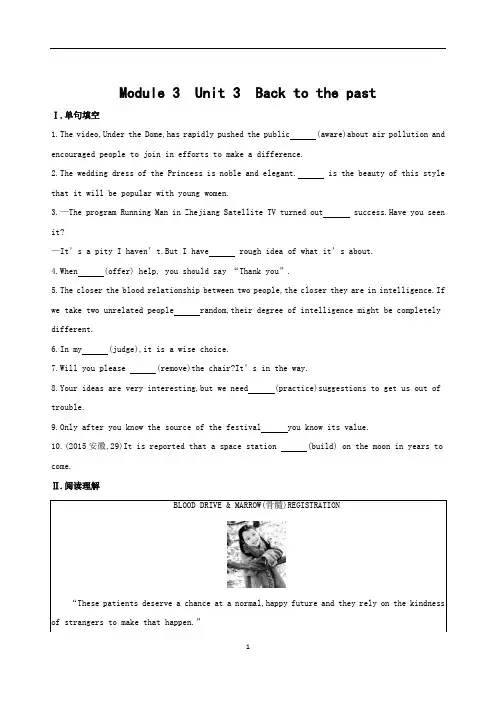
Module 3 Unit 3 Back to the pastⅠ.单句填空1.The video,Under the Dome,has rapidly pushed the public (aware)about air pollution and encouraged people to join in efforts to make a difference.2.The wedding dress of the Princess is noble and elegant. is the beauty of this style that it will be popular with young women.3.—The program Running Man in Zhejiang Satellite TV turned out success.Have you seen it?—It’s a pity I haven’t.But I have rough idea of what it’s about.4.When (offer) help, you should say “Thank you”.5.The closer the blood relationship between two people,the closer they are in intelligence.If we take two unrelated people random,their degree of intelligence might be completely different.6.In my (judge),it is a wise choice.7.Will you please (remove)the chair?It’s in the way.8.Your ideas are very interesting,but we need (practice)suggestions to get us out of trouble.9.Only after you know the source of the festival you know its value.10.(2015安徽,29)It is reported that a space station (build) on the moon in years to come.Ⅱ.阅读理解Marrow Donors:BE THE MATCH1.We can learn from the passage that .A.the blood drive is organized by Isabelle’s motherB.Isabelle receives blood transfusions regularlyC.Isabelle has been ill for 11 monthsD.doctors will sponsor Isabelle’s family2.To be a marrow donor,you must .A.be a relative of the patientB.carry a driver’s licenseC.be at least 18 years oldD.apply to Michael’s Fund3.Those who want to help patients like Isabelle can .e to Wiley Hall every WednesdayB.visit for an appointmentC.contact their parents at 800-283-8385D.call at hospitals in Rhode IslandⅢ.阅读补全(七选五)Evaluating Sources(来源)of Health InformationMaking good choices about your own health requires reasonable evaluation.A key first step in bettering your evaluation ability is to look carefully at your sources of health information.Reasonable evaluation includes knowing where and how to find relevant information,how to separate fact from opinion,how to recognize poor reasoning,and how to analyze information and the reliability of sources. 1Go to the original source.Media reports often simplify the results of medical research.Find out for yourself what a study really reported,and determine whether it was based on good science.Think about the type of study. 2Watch for misleading language.Some studies will find that a behavior “contributes to” or is “associated with” an outcome;this does not mean that a certain course must lead to a certain result. 3 Carefully read or listen to information in order to fully understand it.Use your common sense.If a report seems too good to be true,probably it is.Be especially careful of information contained in advertisements. 4 Evaluate “scientific” statements carefully,and be aware of quackery(江湖骗术).5 Friends and family members can be a great source of ideas and inspiration,but each of us needs to find a healthy lifestyle that works for us.Developing the ability to evaluate reasonably and independently about health problems will serve you well throughout your life.A.Make choices that are right for you.B.The goal of an ad is to sell you something.C.Be sure to work through the critical questions.D.And examine the findings of the original research.E.Distinguish between research reports and public health advice.F.Be aware that information may also be incorrectly explained by an author’s point of view.G.The following suggestions can help you sort through the health information you receive from common sources.Ⅳ.书面表达假如你是李华,最近你校正在开展“感恩父母”的主题征文活动,要求学生就以下图片谈谈自己的感触。
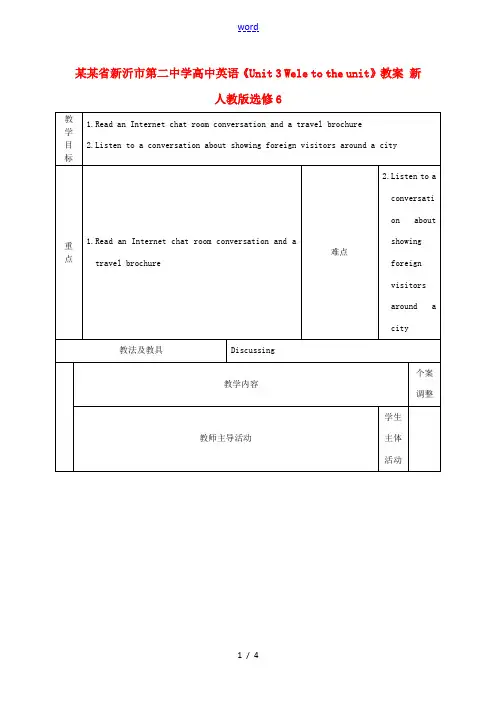
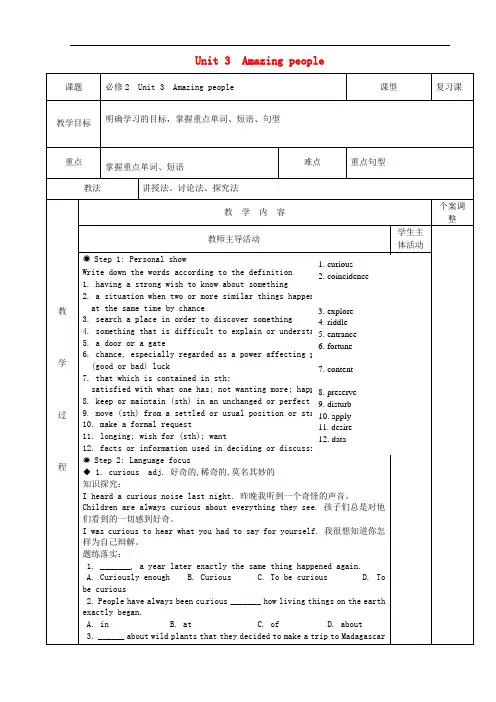
Unit 3 Amazing people课题必修2 Unit 3 Amazing people课型复习课教学目标明确学习的目标,掌握重点单词、短语、句型重点掌握重点单词、短语难点重点句型教法讲授法、讨论法、探究法教学过程教学内容个案调整教师主导活动学生主体活动Step 1: Personal showWrite down the words according to the definition1. having a strong wish to know about something2. a situation when two or more similar things happenat the same time by chance3. search a place in order to discover something4. something that is difficult to explain or understand5. a door or a gate6. chance, especially regarded as a power affecting people's lives:(good or bad) luck7. that which is contained in sth;satisfied with what one has; not wanting more; happy8. keep or maintain (sth) in an unchanged or perfect condition9. move (sth) from a settled or usual position or state10. make a formal request11. longing; wish for (sth); want12. facts or information used in deciding or discussing sth.Step 2: Language focus◆ 1. curious adj. 好奇的,稀奇的,莫名其妙的知识探究:I heard a curious noise last night. 昨晚我听到一个奇怪的声音。
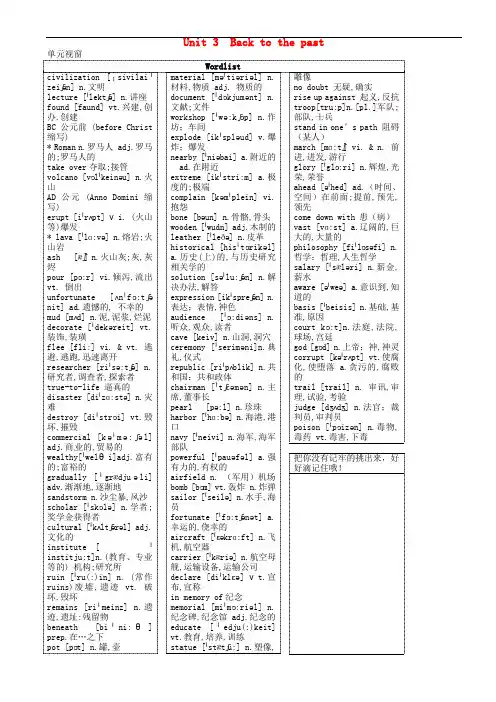
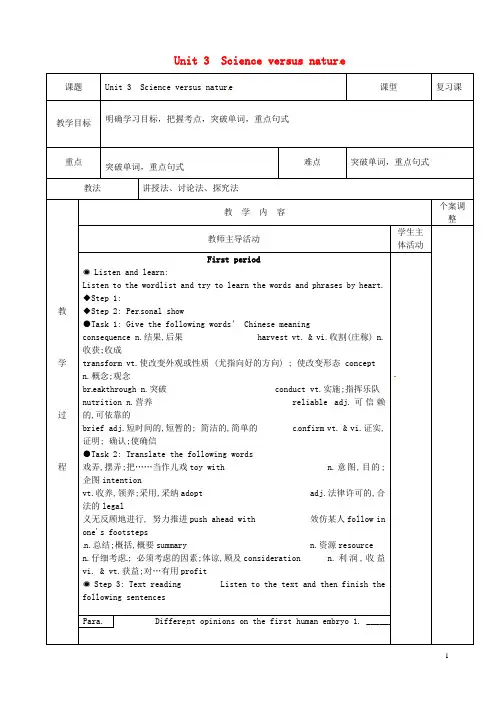
Unit 3 Science versus nature课题Unit 3 Science versus nature课型复习课教学目标明确学习目标,把握考点,突破单词,重点句式重点突破单词,重点句式难点突破单词,重点句式教法讲授法、讨论法、探究法教学过程教学内容个案调整教师主导活动学生主体活动First periodListen and learn:Listen to the wordlist and try to learn the words and phrases by heart.◆Step 1:◆Step 2: Personal show●Task 1: Give the following words’ Chinese meaningconsequence n.结果,后果harvest vt. & vi.收割(庄稼) n.收获;收成transform vt.使改变外观或性质 (尤指向好的方向) ; 使改变形态 conceptn.概念;观念br eakthrough n.突破conduct vt.实施;指挥乐队nutrition n.营养reliable adj.可信赖的,可依靠的brief adj.短时间的,短暂的; 简洁的,简单的confirm vt. & vi.证实,证明; 确认;使确信●Task 2: Translate the following words戏弄,摆弄;把……当作儿戏toy with n.意图,目的;企图intentionvt.收养,领养;采用,采纳adopt adj.法律许可的,合法的legal义无反顾地进行, 努力推进push ahead with 效仿某人follow inone's footstepsn.总结;概括,概要summary n.资源resourcen.仔细考虑; 必须考虑的因素;体谅,顾及consideration n.利润,收益vi. & vt.获益;对…有用profitStep 3: Text reading Listen to the text and then finish thefollowing sentencesPara. Different opinions on the first human embryo 1. _______Homework: 1. Read the text 2. Try to recite the sentences in step 3-Task 1 1For: Human embryo cloning can produce valuable tissues —2. _____ bone or lung tissue —that could be used to 3. ______ human lives.Against: We may be on the producing a real-life F ranken 4.____. Para.2Different opinions on the birth of 5. ________For: People 6. _______ scientists for the scientific breakthrough. Against: Cloning would crea7._____.Para.3~5 Ian Wilmut ’s intention Severion Antinori ’s inte Research efforts should be 8. ______ on creating new tissues and organsfor medical use. Cloning humanembryos with the intention of destroying them shows no 9. _____ for human life. To be the first to clone a humaPara.6Chinese scientists have focused their efforts on cloning 10. ______,as cloned tissues to be used in medical treatment.They have succeeded in cloning cows and goats.板书设计当堂作业 课外作业教学札记。
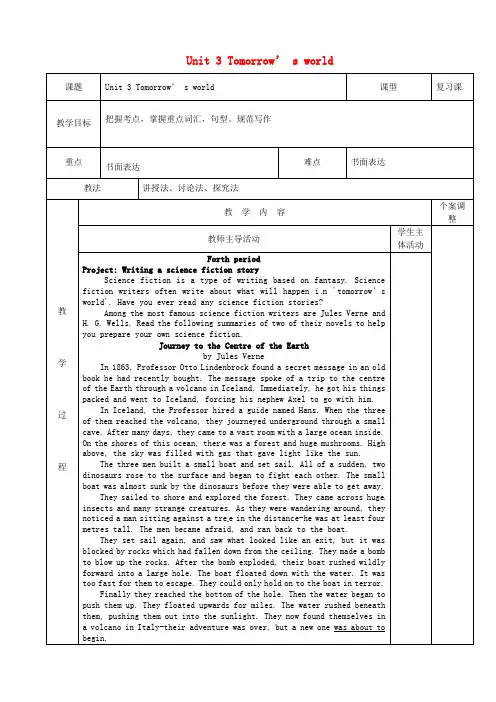
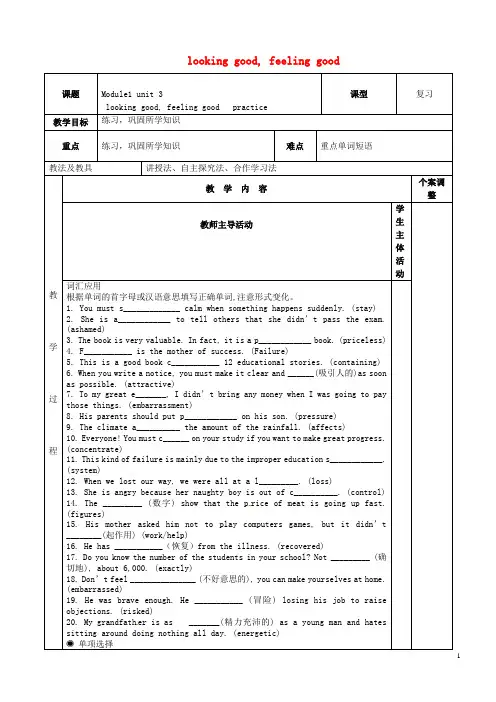
looking good, feeling good课题Module1 unit 3looking good, feeling good practice课型复习教学目标练习,巩固所学知识重点练习,巩固所学知识难点重点单词短语教法及教具讲授法、自主探究法、合作学习法教学过程教学内容个案调整教师主导活动学生主体活动词汇应用根据单词的首字母或汉语意思填写正确单词,注意形式变化。
1. You must s_____________ calm when something happens suddenly. (stay)2. She is a____________ to tell others that she didn’t pass the exam. (ashamed)3. The book is very valuable. In fact, it is a p____________ book. (priceless)4. F___________ is the mother of success. (Failure)5. This is a good book c___________ 12 educational stories. (containing)6. When you write a notice, you must make it clear and ______(吸引人的)as soonas possible. (attractive)7. To my great e_______, I didn’t bring any money when I was going to paythose things. (embarrassment)8. His parents should put p____________ on his son. (pressure)9. The climate a__________ the amount of the rainfall. (affects)10. Everyone! You must c______ on your study if you want to make great progress. (concentrate)11. This kind of failure is mainly due to the improper education s____________.(system)12. When we lost our way, we were all at a l_________. (loss)13. She is angry because her naughty boy is out of c__________. (control)14. The _________ (数字) show that the p rice of meat is going up fast.(figures)15. His mother asked him not to play computers games, but it didn’t________(起作用) (work/help)16. He has ___________(恢复)from the illness. (recovered)17. Do you know the number of the students in your school? Not _________ (确切地), about 6,000. (exactly)18. Don’t feel _______________ (不好意思的), you can make yourselves at home. (embarrassed)19. He was brave enough. He ___________ (冒险) losing his job to raiseobjections. (risked)20. My grandfath er is as _______(精力充沛的) as a young man and hatessitting around doing nothing all day. (energetic)单项选择B) 1. She felt ______ of having done that and tears ran down her cheeks. A. shame B. ashamed C. sorry D.disappointedA) 2. She felt _______ at the ________ situation.A. embarrassed; embarrassingB. embarrassing; embarrassingC. embarrassing; embarrassedD. embarrassed; embarrassedC) 3. I hated the way ________ he treated me.A. whichB. by whichC. thatD. in thatC) 4. The cause of his death ______ his careless driving after too much wine.A. led toB. causedC. lay inD. resulted inC) 5. How I regret ______ your advice.A. not to takeB. having not takenC. not having takenD. not to have takenB) 6. A debate will be held to discuss the effects of the Internet _______ people's lives.A. forB. onC. withD. atC) 7. The way he did it was different _______ we were used to.A. in whichB. in whatC. from whatD. from whichC) 8. ---Mrs. Smith, please teach me how to draw on the computer today.---Oh, no. _________. You have to get familiar with the keyboard first. A. It is never too old to learn B. Think twice before you doC. Learn to walk before you runD. One today is worth two tomorrows 解析:考查谚语在语境中的使用。
Unit 3 Back to the past课题Module3 unit3 Back to the past课型复习教学目标Consolidation and practicing重点Consolidation and practicing难点Consolidation and practicing教法及教具教学过程教学内容个案调整教师主导活动学生主体活动Fifth period词汇应用:根据单词的首字母或汉语意思填写正确单词,注意形式变化。
1. Both Pompeii and Loulan became lost c_______(文明) about 2,000 yearsago. (civilizations)2. This morning we went to a l_____ about Pompeii. (lecture)3. Near the city was a volcano called Vesuvius. On 24th August AD 79,the volcano e_____ and lava, ash and rocks poured out of it onto thesurrounding countryside. (erupted)4. It continued to erupt for the next three days. U_____, all the peoplewere buried alive, and so was the city. (unfortunately)5.So in 1860, the Italian archaeologist Giuseppe Fiorelli was maded______ ( 负责人)of the Pompeii dig. (director)6. Tomorrow we are off to Naples to visit the museum that h______ manyof the treasures from Pompeii. (houses)7. It’s hard to imagine how this quiet volcano d______ the whole city!(destroyed)8. This small, wealthy _____ (商业的)city existed almost 2,000 yearsago. (commercial)9. An archaeologist from the local _____ (文化的) institute, ProfessorZhang told us this. (cultural)10. Sven found the r____ of buildings buried under the sand, togetherwith a lot of treasures, such as coins, painted pots, silk m______,d____ and wall paintings. (remains, materials, documents)11. The desert was once a green land with e___________ trees, but eventhat didn’t prevent the city from being ______ by sand--- what apity! (enormous, buried)12. A saying goes t________ Rome wasn’t built in a day. (that)13. During these years I have had the chance to explore many differentplaces in China and t______ the world. (throughout)14. The next day, US President Franklin Roosevelt d_________ waragainst Japan. (declared)15. A national m______ was built in Pear Harbor just above the remainsof the sunk battleship Arizona. (memorial)单项选择C) 1. Don’t let me catch you ______.A. do that againB. to do that againC. doing that againD.done that againB) 2. The law requires all cars _______ for safety and efficiency.A. being tested regularlyB. to be regularly testedC. be regularly testedD. regularly testedC) 3. He was just about to jump up when he felt something ______ near his feet.A. to moveB. moveC. movingD. movedA) 4. I would like ______ that I don’t have a very high opinion of you.A. to have you knowB. have you knowC. to have your knownD. having you knowA) 5. When he awoke, he found himself ______ in the hospital and ______ by an old woman.A. lying…being looked afterB. lying…be looking afterC. lie…be looked afterD. lie…being looked afterA) 6. If you don’t know the meaning of the word, you can ___ in a dictionary.A. look it u pB. look up itC. refer to itD. consult inA) 7. Neither you nor I, nor anybody else ___ content to live in such a lonely village.A. isB. amC. areD. wereA) 8. Two bags which ______ to Hong Kong were at this moment being loadedaboard a flight to Guangzhou.A. should have goneB. should be goingC. must have goneD. must be goingD) 9. Sometimes we are asked ___ we think the likely result of the program will be.A. howB. whetherC. thatD. whatB) 10. It was said that not until the old man had passed away ___ to his relatives.A. she let out the secretB. was the secret let outC. out she let the secretD. out let the secretD) 11. Mary, it’s already 7 o’clock. I’m afraid there is not muchtime ___ for you to __ for the ball.A. leaving; get dressingB. remaining; get to dressC. remained; get dressedD. left; get dressedD) 12. Free medical treatment in this country covers sickness of mind as well as ___ sickness.A. normalB. averageC. regularD. ordinary D) 13. They will give us the money ___ we pay it back within half a year.A. on no conditionB. on conditionC. under the conditionD. on condition thatC) 14. Not only ___ interested in football but ___ beginning to show an interest in it.A. is the teacher himself, are all his studentsB. the teacher himself is, are all his studentsC. is the teacher himself, all his students areD. the teacher himself is, all his students areC) 15. These two countries have a ___. They both have a high snowfall during winter.A. situationB. responseC. similarityD. conditionD) 16. It is important that we ___ with all that ___ in the struggle.A. should unite, be unitedB. would like, can be unitedC. should unite, could uniteD. unite, can be untied B) 17. John knocked at the door for nearly five minutes___ his wife opened it.A. whenB. beforeC. untilD. whileB) 18. They got the work ______ before the rainy season set in.A. to doB. doneC. doingD. didB) 19. Please remind me ______ some eggs for the coming party.A. buyB. to buyC. of buyingD. for buyingC) 20. Although John was the oldest in the family, he always let hissister ____ charge of the house.A. to takeB. takingC. takeD. taken阅读理解: 2011•辽宁卷C篇Many people believe Henry Ford invented the automobile (汽车). But Henry Ford did not start to build his first car until 1896. That was eleven years after two Germans developed the world's first automobile. Many people believe Henry Ford invented the production line that moved a car's parts to the worker, instead of making the worker move to the parts. That is not true, either. Many factory owners used methods of this kind before Ford. What Henry Ford did was to use other people's ideas and make them better. And he made the whole factory a moving production line.In the early days of the automobile, almost every car maker raced his cars. It was the best way of gaining public notice. Henry Ford decided to build a racing car. Ford's most famous race was his first one. It was also the last race in which he drove the car himself.The race was in 1901, at a field near Detroit. All of the most famous cars had entered, but only two were left: the Winton and Ford's. The Winton was famous for its speed. Most people thought the race was over before it began.The Winton took an early lead. But halfway through the race, it began to lose power. Ford started to gain. And near the end of the race, he took the lead. Ford won the race and defeated the Winton. His name appeared in newspapers and he became well-known all over the United States. Wit hin weeks of the race, Henry Ford formed a new automobile company. In the 1903, a doctor in Detroit bought the first car from the company. That sale was the beginning of Henry Ford's dream. Ford said: "I will build a motor car for the great mass of people. It will be large enough for the family, but small enough for one person tooperate and care for. It will be built of the best materials. It will be built by the best men to be employed. And it will be built with the simplest plans that modem engineering can produce. It will be so lowin price that no man making good money will be unable to own one." The Model T was a car of that kind. It only cost $850. It wasa simple machine that drivers could depend on. Doctors bought the Model T. So did farmers, even criminals. They considered it the fastest and surest form of transportation. Americans loved the Model T. They wrote stories and songs about it. Thousands of Model T's were built in the first few years.A) 63. What do we know about Henry Ford from Paragraph 1?A. He made good use of ideas from others.B. He produced the first car in the world.C. He knew how to improve auto parts.D. He invented the production line.B) 64. Why did Henry Ford take part in the 1901 car race?A. To show off his driving skills.B. To draw public attention.C. To learn about new technology.D. To raise money for his new company.C) 65. “That sale” in Paragraph 4 refers to __________.A. the selling of Ford cars at reduced pricesB. the sale of Model T to the mass of peopleC. the selling of a car to a Detroit doctorD. the sales target for the Ford CompanyA) 66. What was Henry Ford's dream according to the text?A. Producing cars for average customers.B. Building racing cars of simple design.C. Designing more car models.D. Starting more companies.完形填空:2011•四川卷I truly feel that my mother led me here, to Morzaine, and to my future as happy wife and business-woman. When Mum __21__ in October 2007, I was cook… In December that year, while I was working for a wedding, a pearl necklace Mum had left me __22__. I was distraught (忧心如焚的). Some days later, I was __23__ that a guy who was working with us that day. “He could probably have made a fortune __24__ the necklace he found.” __25__, he returned it. Hearing I’d __26__ Mum for six months before her death, he said, “Christmas is going to be__27__—why not go out to the Alps for a couple of weeks? ”I come to Morzaine, a small, friendly village in the Alps and __28__ fell in love with it. What was __29__to be a stopgap (权宜之计) trip turned into a new life. I kept travelling between London and here and felt __30__ than I had in months. In December 2008, I was __31__ asa hotel manager and moved here full time.A month later, I met Paul, who was traveling here. We fell in love.In the beginning, I didn’t want to discuss__32__, because the sadnessof losing Mum __33__ felt great. Paul understood that and never__34__me. But, by summer, we got married. A year later, we used his saving, and the money from the sa le of Mom’s house, to build our own__35__.We want to give our guests a __36__ feel, so each room is themed(以……为题) around memories from our lives. There are also style to remind me of Mom---a tiny chair which __37__ be in her bedroom is set in one room.We are having a wonderful life Mum __38__ naturally part of it, __39__ there’s no way we would be here. If it wasn’t for the __40__ she gave me. I know she’s here in spirit, keeping an eye on us.A) 21. A. died B. came C. returnedD. visited考查动词词义和语境理解。
江苏省新沂市第二中学高中英语《Unit 3 Revision》教案新人教版必修5教学目标Students will learn and master the important language points in the two passages to understand them better.重点Learn and master the im portantlanguage points in the two passages难点How to help the students to learnand master the important languagepoints well.教法及教具 A recorder, a projector and some slides.教学过程教学内容个案调整教师主导活动学生主体活动PracticeS ection A1.Banks was the first ________ crops from one continentto another on a large scale,________ to develop localeconomies with new imports.A.to have moved; to helpB.to move; to helpC.to move; helpingD.moving; helping2.Despite all the benefits of building a factory here, only afew people argued ________ the project.A.in terms of B.in need ofC.in praise of D.in favour of3.________ there was no conclusive evidence, mostpeople thought he was guilty.A.When B.As far asC.As long as D.While4.He ________ his plan for dropping out of the universityregardless of his parents' opposition.A.pushed along B.pushed ahead withC.pushed for D.pushed forward5.The poor mother, who had been ill in bed, had to haveher little son ________ at his uncle's.A.adapted B.adopted C.adjusted D.applied6.—Was the suspect pronounced guilty?—Yes, the new evidence ________ t he first witness' story.A.confirmed B.claimedC.declared D.observed7.(2013·益阳高二检测)He stood there without daring tolift his head as a ________ of his wrong action.A.summary B.consequenceC.conclusion D.effect8.Every country has the responsibility to ensure a safe,________ and healthy development of the nuclear energy. A.flexible B.reliableC.available D.acceptable9.I would like a job which pays more, but ________ I enjoy the work I'm doing at the moment.A.in other words B.on the other handC.for one thing D.as a matter of fact10.(2013·邵阳高二调研)My son prefers us to email each other once a week ________ spend half an hour on the phone every night.A.other than B.rather thanC.more than D.instead of11.—Could you d o me a ________ and take the box up to the sixth floor?—With pleasure.No problem at all.A.favour B.goodC.pleasure D.kindness12.—How can you borrow my computer without my ________?—Oh, I forgot to tell you.I hope you don't mind. A.permit B.permissionC.belief D.instructions13.Examtakers' “virtue” will be taken into ________ in the next nationwide public servants' exam.A.focus B.targetC.consideration D.contribution14.—How about your school?—Oh, very good.You can't find ________ one in this city. A.the better B.the bestC.a better D.better15.Not until he left his home ________ to know how important the family was for him.A.did he begin B.had he begunC.he began D.he had begunSection B(18 marks)One day I was mailing a package in the office when I saw a woman approach the postal clerk.“I found this lying on thefloor by my box,” she said, “and I'd like to hand it in.”The postal clerk laughed and said, “I've __16__ had anyone hand in money before, but I'll put it in an envelope.Please write your name and telephone number on the front.If no one __17__ the money, we'll call you.”The lady explained, “I've lost money before and it was never turned in.I remember how I __18__.I don't want to make someone else feel that way.” The postal clerk responded with her own__19__ of having dropped some money while shopping and not knowing it __20__ she was preparing to pay for her purchases.I admit that I'd slowed down on my preparations as I was busy listening to their __21__.The lady who handed in the money left the post office.At almost the same time a very young woman __22__.She approached the postal clerk and asked, “Has anyone turned in any money recently?”She told the clerk the __23__,and the clerk laughed again.“As a matter of fact, yes!” she responded.“It was turned in just several __24__ ago.”Then a young man r an in and said, “It's not on the ground!”She turned to him and said, “Someone turned the money in!”The look of __25__ on both of these young people's faces is a memory I'll have for a long time.The young lady told how she thought the money was __26__ in her coat pocket when she walked in to check her mailbox.Only when she arrived home did she __27__ that it was no longer there.Yes, I finally finished preparing the package to be mailed, but I was the one who had a very special surprise in the post office.16.A.often B.always C.never D.occasionally 17. A.claims B.requires C.accepts D.seeks 18.A.behaved B.felt C.reacted D.imagined 19.A.way B.intention C.memory D.risk 20.A.until B.when C.after D.though 21. A.debate B.quarrel C.lecture D.conversation22.A.drove in B.rushed in C.cut in D.broke in 23.A.event B.time C.story D.amount 24.A.minute B.hours C.days D.weeks 25.A.surprise B.relief C.depression D.excitement 26.A.generally B.merely C.badly D.securely27.A.believe B.dou bt C.realize D.proveSection C(2013·衡阳八中高二上期中)Laurie and Jake Rohrer live near the small town of Ha'iku on the Ha waiian island of Maui.They have a recording studio in their home.They are helping to support the music of artists who they say are extremely talented yet largely unknown.Jake built a recording studio in their garage.The couple produced a CD with a singer named Ata.The Rohrers wanted to continue producing music, so they es tablished their own record label.They chose the name that one of their artists had given to their home—Ululoa. The Rohrers decided to invite only native singers they liked to record with them.They say they give their artists freedom of expression and cultural respect.They also give them half the profits once sales have paid back the cost of producing a CD.There are no contracts (合同).Jake Rohrer says everyt hing is settled with a handshake based on the Hawaiian tradition of pono.51.________ inHawaii52.________ The RohrersPurposeTo support the music of artists extremely talented yet largely 53.________Place 54.________ Record label name Ululoa55.________ Only native singersHow to 56.________A handsh ake based on the 57.________ Hawaiian pono58.________ Helping to 59.________ Producing good musicFuture plan60.________ new Hawaiian singers to record on the Ululoa label。
(江苏专用)2016-2017学年高中英语Unit 3 Back to the past Period Two Word power & Grammar and usage课时作业牛津译林版必修3编辑整理:尊敬的读者朋友们:这里是精品文档编辑中心,本文档内容是由我和我的同事精心编辑整理后发布的,发布之前我们对文中内容进行仔细校对,但是难免会有疏漏的地方,但是任然希望((江苏专用)2016-2017学年高中英语Unit 3 Back to the past Period Two Word power & Grammar and usage课时作业牛津译林版必修3)的内容能够给您的工作和学习带来便利。
同时也真诚的希望收到您的建议和反馈,这将是我们进步的源泉,前进的动力。
本文可编辑可修改,如果觉得对您有帮助请收藏以便随时查阅,最后祝您生活愉快业绩进步,以下为(江苏专用)2016-2017学年高中英语Unit 3 Back to the past Period Two Word power & Grammar and usage课时作业牛津译林版必修3的全部内容。
Period Two Word power & Grammar and usageⅠ.单项填空1.When we saw the road ________ with snow,we decided to spend the holiday at home。
(2013·北京,29)A.block B.to blockC.blocking D.blocked答案D解析考查非谓语动词作宾语补足语的用法。
句意为:发现路面被雪封住,我们决定在家度假.宾语补足语block与宾语road为被动关系,故选D项。
2.Fifteen minutes ________all that I can spare to talk over this matter with you。
Unit 3 Back to the past 单元视窗Wordlistcivilization [ˌsivilaiˈzeiʃən] n.文明lecture [ˈlektʃə] n.讲座found [faund] vt.兴建,创办,创建BC 公元前 (before Christ 缩写)* Roman n.罗马人 adj.罗马的;罗马人的take over夺取;接管volcano [vɔlˈkeinəu] n.火山AD 公元 (Anno Domini 缩写)erupt [iˈrʌpt] νi. (火山等)爆发* lava [ˈlɑ:və] n.熔岩;火山岩ash [æʃ] n.火山灰;灰,灰烬pour [pɔ:r] vi.倾泻,流出vt. 倒出unfortunate [ʌnˈfɔ:tʃənit] ad.遗憾的, 不幸的mud [mʌd] n.泥,泥浆,烂泥decorate [ˈdekəreit] vt.装饰,装璜flee [fli:] vi. & vt. 逃避,逃跑,迅速离开researcher [riˈsə:tʃə] n.研究者,调查者,探索者true-to-life 逼真的disaster [diˈzɑ:stə] n.灾难destroy [diˈstrɔi] vt.毁坏,摧毁commercial [kəˈmə:ʃəl] adj.商业的,贸易的wealthy[ˈwelθi]adj.富有的;富裕的gradually [ˈgrædjuəli] adv.渐渐地,逐渐地sandstorm n.沙尘暴,风沙scholar [ˈskɔlə] n.学者;奖学金获得者cultural [ˈkʌltʃərəl] adj.文化的institute [ˈinstitju:t]n.(教育、专业等的) 机构;研究所ruin [ˈru(:)in] n. (常作ruins)废墟,遗迹vt. 破坏,毁坏remains [riˈmeinz] n.遗迹,遗址:残留物beneath [biˈni:θ] prep.在…之下pot [pɔt] n.罐,壶material [məˈtiəriəl] n.材料,物质 adj. 物质的document [ˈdɔkjumənt] n.文献;文件workshop [ˈwə:kʃɔp] n.作坊;车间explode [ikˈspləud] v.爆炸;爆发nearby [ˈniəbai] a.附近的ad.在附近extreme [ikˈstri:m] a.极度的;极端complain [kəmˈplein] vi.抱怨bone [bəun] n.骨骼,骨头wooden [ˈwudn] adj.木制的leather [ˈleðə] n.皮革historical [hisˈtɔrikəl]a.历史(上)的,与历史研究相关学的solution [səˈlu:ʃən] n.解决办法,解答expression [ikˈspreʃən] n.表达;表情,神色audience [ˈɔ:diəns] n.听众,观众,读者cave [keiv] n.山洞,洞穴ceremony [ˈseriməni]n.典礼,仪式republic [riˈpʌblik] n.共和国;共和政体chairman [ˈtʃɛəmən] n.主席,董事长pearl [pə:l] n.珍珠harbor [ˈhɑ:bə] n.海港,港口navy [ˈneivi] n.海军,海军部队powerful [ˈpauəfəl] a.强有力的,有权的airfield n. (军用)机场bomb [bɔm] vt.轰炸 n.炸弹sailor [ˈseilə] n.水手,海员fortunate [ˈfɔ:tʃənət] a.幸运的,侥幸的aircraft [ˈɛəkrɑ:ft] n.飞机,航空器carrier [ˈkæriə] n.航空母舰,运输设备,运输公司declare [diˈklɛə] νt.宣布,宣称in memory of纪念memorial [miˈmɔ:riəl] n.纪念碑,纪念馆 adj.纪念的educate [ˈedju(:)keit]vt.教育,培养,训练statue [ˈstætʃu:] n.塑像,雕像no doubt 无疑,确实rise up against 起义,反抗troop[tru:p]n.[pl.]军队;部队,士兵stand in one’s path 阻碍(某人)march [mɑ:tʃ] vi. & n. 前进,进发,游行glory [ˈglɔ:ri] n.辉煌,光荣,荣誉ahead [əˈhed] ad.(时间、空间)在前面;提前,预先,领先come down with 患(病)vast [vɑ:st] a.辽阔的,巨大的,大量的philosophy [fiˈlɔsəfi] n.哲学;哲理,人生哲学salary [ˈsæləri] n.薪金,薪水aware [əˈweə] a.意识到,知道的basis [ˈbeisis] n.基础,基准,原因court kɔ:t]n.法庭,法院,球场,宫廷god [gɔd] n.上帝;神,神灵corrupt [kəˈrʌpt] vt.使腐化,使堕落 a.贪污的,腐败的trail [trail] n. 审讯,审理,试验,考验judge [dʒʌdʒ] n.法官;裁判员,审判员poison [ˈpɔizən] n.毒物,毒药 vt.毒害,下毒把你没有记牢的挑出来,好好滴记住哦!Lost civilizations Focus Day 1, 15 JulyI feel lucky to have won a place on this trip. We are in Italy now,and tomorrow we are visiting Pompeii. Next week we are flying to China,and going to Loulan, which is known as China's Pompeii in the desert.Both Pompeii and Loulan became lost civilizations long ago.Day 2—16th JulyThis morning we attended a lecture about Pompeii. The city wasfounded in the 8th century BC. In 89 BC, the Romans took over Pompeii.It then became a rich and busy city. Near the city was a volcano. On24th August AD 79, the volcano erupted and lava, ash and rocks pouredout of it onto the surrounding countryside. It continued to erupt forthe next two days. Many people were buried alive, and so was the city.How unfortunate!Day 3—17th JulyToday I saw the ancient Roman city of Pompeii as it was 2,000 yearsago. How amazing! The city was forgotten for many years until the 18thcentury when a farmer discovered a stone with writing on it. People started to dig in the area for treasure, which caused much damage. Thus, in 1860, the area was put under government protection so it could be preserved and studied.When I walked around the city, I saw streets just as they had been, with stepping stones along the road so you did not have to step in the mud on rainy days! I saw several houses which were decorated with wall paintings. I also saw the people who had been buried alive. It turns out that after the ash covered the people who failed to flee the city, their bodies nearly completely broke down and disappeared, leaving empty spaces in the ash. Years later, researchers were able to use these empty spaces to produce true-to-life figures of the people who had died in the disaster. You can see them today in Pompeii, in the same places where the people fell. The volcano is still there, but looks very quiet now. It’s hard to imagine how this peaceful volcano destroyed th e whole city! Day 10—24th JulyFinally, we arrived in Loulan after several days of traveling. This commercial city was busy and wealthy about 2,000 years ago. It was a stopping point on the famous Silk Road between the East and the West. It is believed to have been gradually covered over by sandstorms from AD 200 to AD 400. I am so excited to be here!Day 11—25th JulyA scholar from the local cultural institute, Professor Zhang, told us that around the year 1900 the European explorer Sven Hedin discovered the ruins of the Loulan Kingdom. Sven found the remains of buildings buried beneath the sand, together with a lot of treasures, including coins, painted pots, materials such as silk, documents and wall paintings. When we went to the city, we saw the city walls, palaces, temples, workshops and towers. We found the ruin s most interesting. There was an ancient water system that ran through the middle of the city. The desert was once a green land with huge trees, but they were cut down and that resulted in the city being buried by sand—what a pity! put preserveFirst periodListen and learn:Listen to the wordlist and try to learn the words and phrases by heart.◆Step 1:◆Step 2: Personal show●Task 1: Give the following words’ Chinese meaningsolution n. take overpour vi. vt. powerful a.decorate vt. fortunate a.commercial adj. scholar n.rise up against stand in on e’s pathdocument n. explode v.aware a. corrupt [kəˈrʌpt] vt. a.●Task 2: Translate the following wordsvt.兴建,创办,创建ad.遗憾的, 不幸的逼真的νt.宣布,宣称n.塑像,雕像患(病)n.基础,基准,原因vi.抱怨n.法官;裁判员,审判员n.毒物,毒药 vt.毒害,下毒Step 3: Text reading Listen to the text and then finish the following sentences●Task 1: Fill in the blanks according to the text1. Many people were buried alive, and _______ (城市也被掩埋了) . ________ (真是不幸) .2. Today I saw the ancient Roman city of Pompeii ____________ (正如它2000年前的样子) .3. Thus, in 1860, the area ___________(纳入政府的保护下) so it could be preserved and studied.4. It is believed __________ (已被风沙渐渐覆盖) by sandstorms from AD 200 to AD 400.5. The desert was once a green land with huge trees, but they were cut down and that ________________ (导致这个城市被埋) by sand—what a pity!d, together withHomework:1. Read the text2. Try to recite the sentences in step 3-Task 1Second periodStep 1: Personal showRead the text as quickly as you can.Step 2: Language focus◆ 1. put 短语知识探究:He had already put everything in place. 他把一切都准备好了。